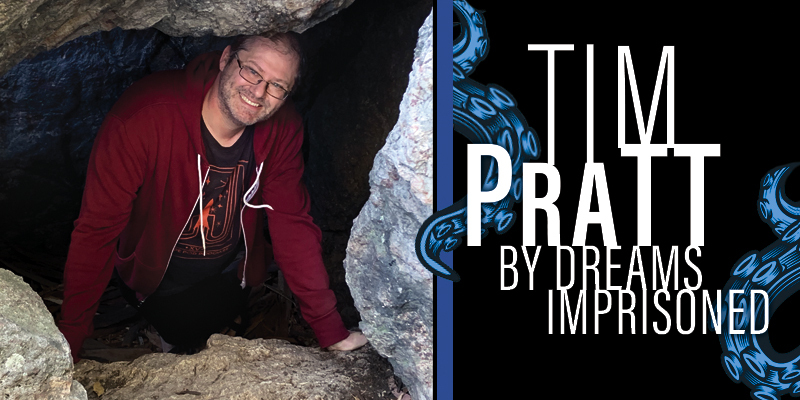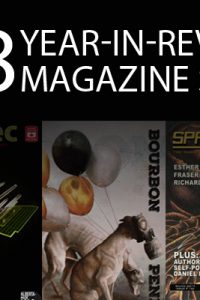Tim Pratt: By Dreams Imprisoned

Timothy Aaron Pratt was born December 12, 1976. He traveled with his mother as a child, living in Missouri, Texas, Louisiana, and West Virginia before settling back in Goldsboro. Pratt went to Appalachian State University in Boone NC, graduating with a BA in English in 1999, and attended the Clarion Writers Workshop that summer. He worked as an advertising copywriter briefly before moving to Santa Cruz CA in 2000. In 2001 he relocated to the Bay Area and began working as an editorial assistant at Locus, where he is now a senior editor and occasional reviewer.
Pratt began publishing genre material professionally with poem ‘‘Bacchanal’’ in Asimov’s (2001). ‘‘Soul Searching’’ won a Rhysling Award for best long poem in 2005. Some of his poetry was collected in If There Were Wolves (2006).
Pratt’s first professional story sale was ‘‘The Witch’s Bicycle’’ (2001). Other notable stories include Nebula Award finalist ‘‘Little Gods’’ (2002); Hugo Award winner ‘‘Impossible Dreams’’ (2006); Stoker Award finalist ‘‘The Dude Who Collected Lovecraft’’ (2008, with Nick Mamatas); and Theodore Sturgeon Memorial Award finalist ‘‘Her Voice in a Bottle’’ (2009). ‘‘Hart and Boot’’ (2004) was reprinted in The Best American Short Stories: 2005. Some of his short fiction has been collected in Little Gods (2003), World Fantasy Award finalist Hart & Boot & Other Stories (2007), Antiquities and Tangibles (2013), and Miracles & Marvels (2019). He publishes a new short story every month for Patreon supporters at <www.patreon.com/timpratt>.
First novel The Strange Adventures of Rangergirl (2005) was a Mythopoeic Award finalist, and won the Emperor Norton Award for best Bay Area novel. His Marla Mason urban fantasy series began with Blood Engines (2007, as T.A. Pratt), and continued for ten volumes and a prequel short novel, concluding with Closing Doors (2017). A collection of related stories, Do Better, followed in 2018.
His Axiom space opera series launched with Philip K. Dick Award finalist The Wrong Stars (2017) and continued with The Dreaming Stars (2018) and The Forbidden Stars (2019), plus collection The Alien Stars and Other Novellas (2021).
The Journal of Zaxony Delatree duology is Doors of Sleep (2021) and Prison of Sleep, out in May 2022.
Other books include science fantasy The Nex (2010), gonzo-historical The Constantine Affliction (2012, as T. Aaron Payton), standalone contemporary fantasies Briarpatch (2011; revised 2022) and Heirs of Grace (2014), and short novel The Deep Woods (2015). He has also written tie-ins for Forgotten Realms, Pathfinder Tales, Twilight Imperium, and other properties.
The first book in a new series, Conquest of Nigh-Space, is forthcoming in 2023.
Pratt edited Star*Line, the magazine of the Science Fiction Poetry Association, from 2002 to 2004. With his wife Heather Shaw, he co-edited ‘zine Flytrap from 2003 to 2008, with a one-off revival issue in 2014. He also edited reprint anthology Sympathy for the Devil (2010) and co-edited original anthology Rags and Bones with Melissa Marr (2013).
Pratt was a finalist for the Campbell Award for best new writer in 2004. He lives in Berkeley CA with his wife and their child, River.
Excerpt from the interview:
‘‘I am still doing the work-for-hire thing. As always, my rule is, I’ll take on a job if it sounds fun or expands my skillset or would have made 14-year-old-me happy. Funnily enough, I never stopped working with Marc Gascoigne. After he left Angry Robot, he went over to Aconyte, which publishes various sorts of tie-ins, including for board games. I know that sounds strange – how are you going to write a tie-in for Sorry or Scrabble or something? But they do various Fantasy Flight games, which have a lot of lore – Arkham Horror, Dead of Winter, games like that, with actual worldbuilding and characters. One of the properties Marc had to find writers for was Twilight Imperium, which is a giant, beloved, incredibly complicated space opera strategy game. Mark told me he was taking notes on the project and when he jotted down ‘T IMP’ his handwriting rendered it as ‘TIM P,’ so it was obviously a sign from the heavens. Sometimes that’s all it takes, folks.
‘‘Since I’d sold him the Axiom series, I seemed like a good choice, though I wasn’t sure at first. The Twilight Imperium game is all about the movements of fleets and nations. It’s a big top-down strategy game. I don’t write that stuff. I’m not that good at the bird’s-eye view – I write people who have stuff exploding all around them and they don’t know what the hell is going on. But Marc explained they weren’t looking for the big-picture stuff – they wanted human-scale stories against the backdrop of these huge machinations. Or person-scale; most of the characters aren’t actually human. I can definitely tell stories like that. They sent me a ton documentation with a lot of lore. The game is about these alien factions all vying for control of the galaxy amid the ruins of a past, failed empire. It’s a fun world, and they dropped a bunch of lore on me, but I’ve written for Dungeons & Dragons and Pathfinder Tales, which had a lot of source material to absorb. Twilight Imperium has a very deep data set for a board game, but I’ve had to synthesize more. I was able to read and absorb everything there was about the game at the time (there’s more now, since they’re doing an RPG), and come up with some pitches.
‘‘I offered them three ideas. One of them was a series of heists and chases with rogues in space. One of them was playing with lost princess tropes, where somebody on a backwater planet finds out she has this connection to a secret, powerful alien lineage. The last was an espionage thriller. I sent the pitches in, figuring they’d pick one, and I’d be happy to write any of them. And then… they wanted to do all three. We decided to create a loosely connected trilogy where main characters from one book would appear as supporting characters in another, with one fairly major character as a through-line in all three. So I got to explore all kinds of fun space opera tropes, and they let me make it very queer, which is good, because it meant I didn’t have to try to sneak that stuff in all subtly. The trilogy is The Fractured Void, The Necropolis Empire (my personal favorite), and The Veiled Masters. They got the artist who did the iconic box art, Scott Schomberg, to do the book covers, and when you put all three together, they form a triptych, which is so cool. I just finished up the final, final, final round of revisions on the third book. Now that I think of it, this phase of my career is all thanks to Marc Gascoigne, so, thanks Marc!
‘‘I spent 2019 and 2020 reading nothing but speculative fiction, and lots of it, because I was on two awards juries. I was on the jury for the inaugural Ray Bradbury Prize from the LA Times Book Awards, with Kelly Link and Tananarive Due, and we judged it the second year, too. That was super cool. When I got invited, I looked around and thought, ‘One of us does not belong here. I am the odd-person out in this esteemed company.’ Tananarive knows everything there is to know about horror, and Kelly is a MacArthur Genius and edited The Year’s Best Fantasy and Horror back in the day. I thought about that and realized: ‘Oh, shit, I’m the spaceship guy. That’s why they asked me, I did a science fiction trilogy, and they needed a spaceship guy.’ Little did they know that as a reader I’m more into weird horror and fantasy. The books we chose as winners were Marlon James’s Black Leopard, Red Wolf and Stephen Graham Jones’s The Only Good Indians. Kelly and Tananarive were brilliant and we were actually in accord about the stuff we loved. When we put together our initial lists there was a lot of overlap, and it wasn’t hard to winnow things down, because we wanted our shortlists to show off the breadth of the field – that award is for best speculative book, not just novel, so it’s novellas and collections, too. Not anthologies, but everything else.
‘‘I was also on the Philip K. Dick Award Jury one of those years – my reasoning was, I’m reading everything for the Bradbury Prize anyway, and the Dick is just a subset of stuff I’d read for the Bradbury, so it’s not really more work. This interview is revealing my capacity for self-delusion. I got sent a million books that I never would have seen otherwise for the Dick, but we also settled pretty easily on a great winner, The Road to Winter by Alison Stine. But it was so much reading. So much reading.
‘‘Last year and this year so far I’ve mostly read crime novels and comic books, catching up on all the stuff I couldn’t read when I could only read the genre. But for those two years, I had as much of a sense as one can have of the field as a whole, and the field is great. I am seeing so many voices that I didn’t see when I was starting out, at least not widely available from major presses. It’s not like science fiction has overcome its issues with a lack of diversity, but the trend is positive. When you look at the award lists, it’s so much better than it was when I started out. From my position of voraciously reading SF and fantasy from age seven or so, things are as good as they’ve ever been. And you might not think it to look at me, a middle-aged white guy, but the expanding acceptance of different voices in the field has enabled me to write about things I would have once been hesitant to explore. I grew up poor, in the South, and was always comfortable writing about that stuff, but in my recent work I’m a lot more comfortable writing outside heteronormativity, the gender binary, and monogamy. I finally came out as bisexual some years ago – it was something I never talked about, and had to explore very carefully when I lived in the South in the ’90s. Even after I moved to the Bay Area and we entered a new century and those qualities were more socially acceptable in my milieu, I didn’t talk about it, because I thought I shouldn’t make a fuss or claim that identity. After all, I married a woman, I’m completely straight-passing, and I mostly sidestepped all the hard parts of being bi/pan. Sure, there was some emotional stuff to work through, but I never suffered any real prejudice or problems. Why would I make a bunch of noise and call attention to the fact that I’m queer when there are so many people who’ve had to fight for their ability to identify that way, and who write about it so well? It felt like jumping up and down and saying, ‘Hey, pay attention to me!’ When I’m a white guy and people pay plenty of attention to me anyway. Then some friends of mine, including the great writer Haddayr Copley-Woods, talked to me and explained how powerful it can be for people like me, in positions of privilege who can pass, to come out. It lets the rest of the world know we’re actually all around you. You can’t tell by looking. There was never any pressure for me to come out, of course, because my friends are great and everyone has to deal with their position relative to the closet in their own way and in their own time… but the point made sense to me, so on the next National Coming Out Day, I did.
‘‘Attentive readers of my work were not all that surprised. Queer people and non-traditional relationship structures and kink have popped up in my fiction often, and I always said, ‘I want my fictional worlds to be at least as diverse as my neighborhood.’ But people picked up on the subtext. The response was a resounding, ‘Well, yeah. We figured.’
‘‘I do feel more comfortable writing about that stuff more openly these days because I’ve been inspired by the explosion of work by queer voices. I can just… talk about it! And write about it explicitly in a way that’s less coded and more open. ‘Hey, by the way…. This is me!’
Interview design by Stephen H. Segal.
Read the full interview in the April 2022 issue of Locus.
 While you are here, please take a moment to support Locus with a one-time or recurring donation. We rely on reader donations to keep the magazine and site going, and would like to keep the site paywall free, but WE NEED YOUR FINANCIAL SUPPORT to continue quality coverage of the science fiction and fantasy field.
While you are here, please take a moment to support Locus with a one-time or recurring donation. We rely on reader donations to keep the magazine and site going, and would like to keep the site paywall free, but WE NEED YOUR FINANCIAL SUPPORT to continue quality coverage of the science fiction and fantasy field.
©Locus Magazine. Copyrighted material may not be republished without permission of LSFF.








